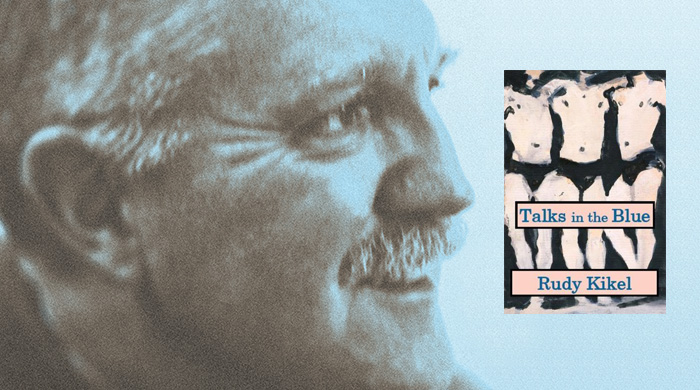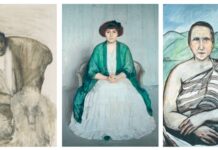Boston’s most formidable gay poet, activist and arts and poetry editor is also responsible for the iconic name of LGBT newspaper Bay Windows
Before gay rights, there was gay writing. Author Christopher Bram wrote recently that “the gay revolution began as a literary revolution.” In Boston, no gay male writer has had more influence or staying power than poet Rudy Kikel. Publishers Weekly called his work “in the tradition of Oscar Wilde, stylish, elegant, and clever.” In 1992, Kikel won a Cultural Achievement Award from the Greater Boston Lesbian/Gay Political Alliance. In 1997, he won the Grolier Award for poetry. Kikel has published five books of poetry and edited two collections. Kikel was also responsible for giving Bay Windows its name. New England’s LGBT weekly newspaper will turn 30 years old this year. He was the paper’s long-time arts and poetry editor. Kikel’s poetry is autobiographical and strikingly personal. While gay men recognize themselves in the details (cruising, coming out) Kikel also addresses universal themes: school, dates, parental relations and finding one’s own path. His poems are so accessible, it is easy to miss the double meanings and careful structure. For example, in “Show Dancing,” Kikel reveals how he and a college friend often ditched their dates early in the evening for quiet encounters together.
… (dates) had been deposited at their homes, talks in the blue sedan would ensue, during which Bob’s hands would be innocently called into play upon your person — or your nerves — as on a musical instrument …
Kikel’s poems consist of alternating lines of seven and eight syllables. The lines roll along with ease of sound and meaning but the small variation in syllables prods the reader to look deeper. Critic George Klawitter has dubbed these metered lines, “kikels,” in Rudy’s honor. Although not overtly political, Kikel’s poems fostered an emerging gay identity. Scholar Michael Bronski met Kikel in the late 1970s. Bronski stands by a statement he made in a 2004 interview, “… while other people who saw themselves as artists were adamant in always distancing themselves from any political movement, Rudy saw his art as part of — I don’t know whether he’d use this word — the enormous upsurge of gay literature.” Born in Brooklyn in 1942 of immigrant parents, Kikel came from a family of outsiders. His parents came from Gottschee, a tiny province in what is now Slovenia. Gottscheers are a distinct ethnic and linguistic group whose dialect resembles medieval German. Over the centuries Gottschee was invaded by Turks, occupied by Napoleon, and swallowed up by Yugoslavia. This outsider perspective served Kikel as a gay poet. After attending Catholic schools, Kikel entered St. John’s University in Queens, New York, in 1960. On the outside, he was a conventional student majoring in English. He joined a fraternity and had a girl friend. But on weekend nights, he frequented gay bars in nearby Jackson Heights and on Long Island. It was around this time that he brought his sister (his only sibling) to a gay bar called the Hayloft. He wanted to introduce her to his other life. When she saw Rudy kiss another boy, she cried and ran out of the bar. Later, she called him a “faggot” in front of their parents who had no idea what the word meant.
After college, Kikel earned a master’s degree from Penn State and in 1975, he completed a Ph.D. in English from Harvard. He taught at Suffolk University for a short time but disliked it and soon quit. He moved to an apartment on Charles Street on Beacon Hill where he became the building’s superintendent, while he wrote poetry.
For Kikel, the 1970s were filled with bars, sex, and dinner parties. He was still writing and hanging out with other writers. Kikel still recalls the night he attended a party on Beacon Hill at which the late writer Paul Monette famously met his future partner Roger Horwitz. (Monette wrote about the meeting in Becoming A Man: Half A Life Story.) As they left the party, Monette turned to Horwitz and said, “Welcome to the rest of your life.”
By 1983, Kikel was ready for a change. He wanted to move to New York City to be closer to family and to ramp up his sex life at the clubs along the Hudson, including a favorite, the Mineshaft, which even by the standards of the time, was notorious.
But as Kikel prepared to leave, local entrepreneur Sasha Alyson asked him to stay. Allyson was starting a gay weekly newspaper focusing on local news from a mainstream progressive perspective. The other gay paper in town, Gay Community News, founded in 1973, had a national focus with a militant tilt.
Alyson, who now lives in Southeast Asia, recently recalled a brain storming session with Kikel about the naming of the new paper. “[Rudy and I] looked through a list of words and phrases associated with Boston and came upon “bay windows.” Kikel argued that in addition to being a familiar Boston architectural element, “bay windows” suggested multiple views on Boston’s GLBT community. The name stuck.
Kikel says his decision to remain in Boston may have saved him from AIDS, which took the lives of many men in his generation, including his lover Craig Rowland, who died in 1991.
Slowed by illness in recent years, Kikel’s sense of humor is undiminished. When asked where he met his husband, Sterling Giles (they married in February 2012), Kikel’s eyes brighten and he laughs quietly, “We met on the Esplanade about 25 years ago — during the day!” Long seen as a nighttime cruising area, the Esplanade runs along the Charles River. Life in the shadows was never for him. [x]









